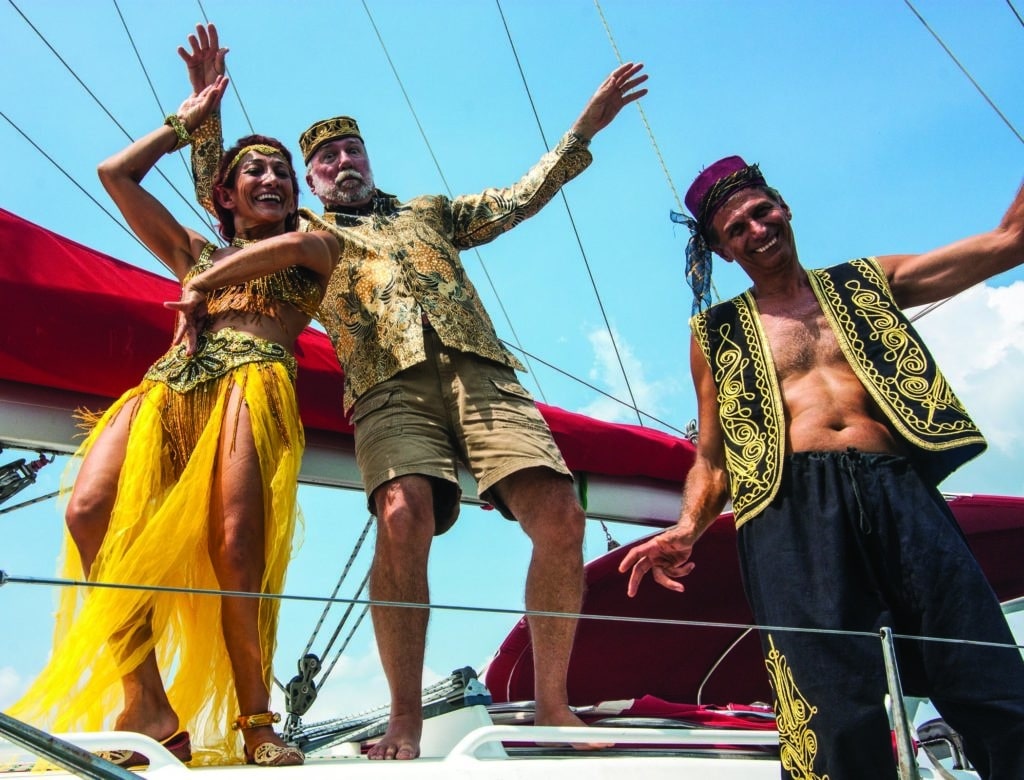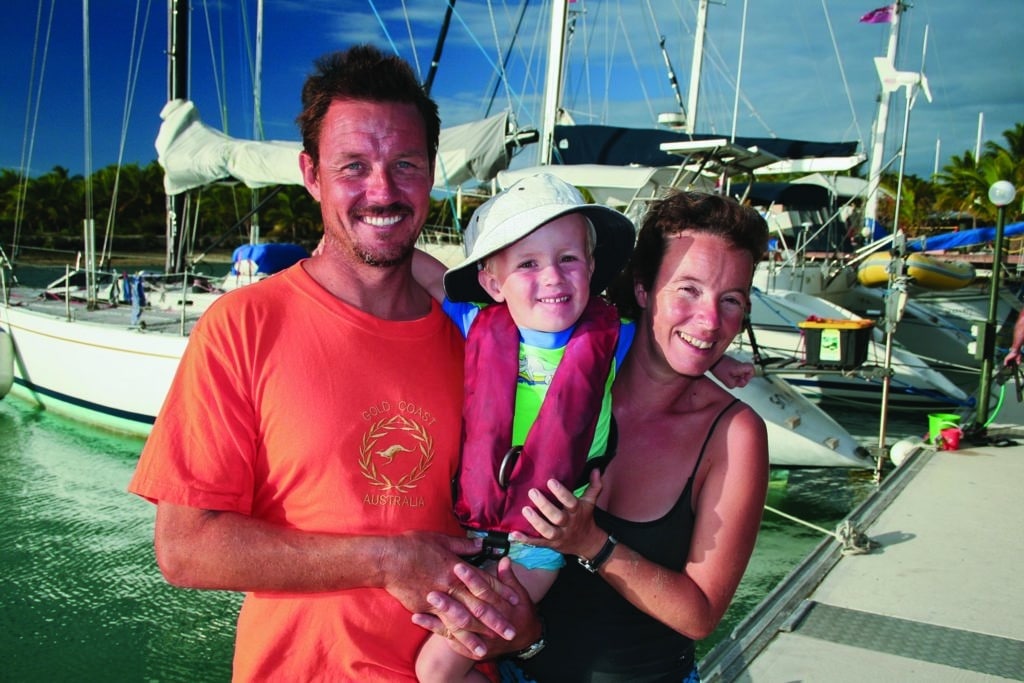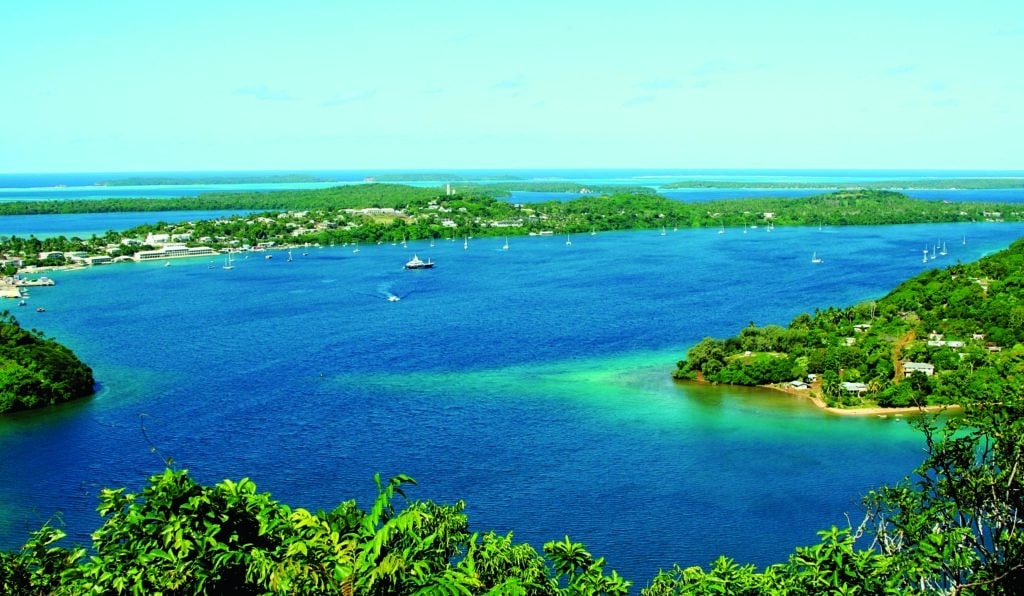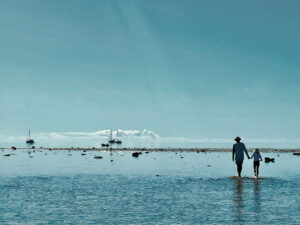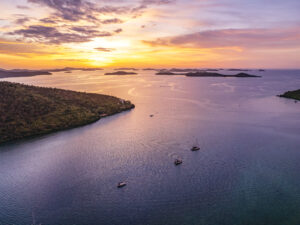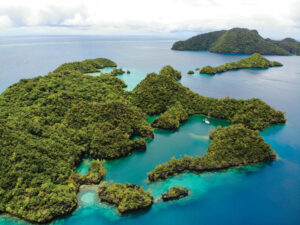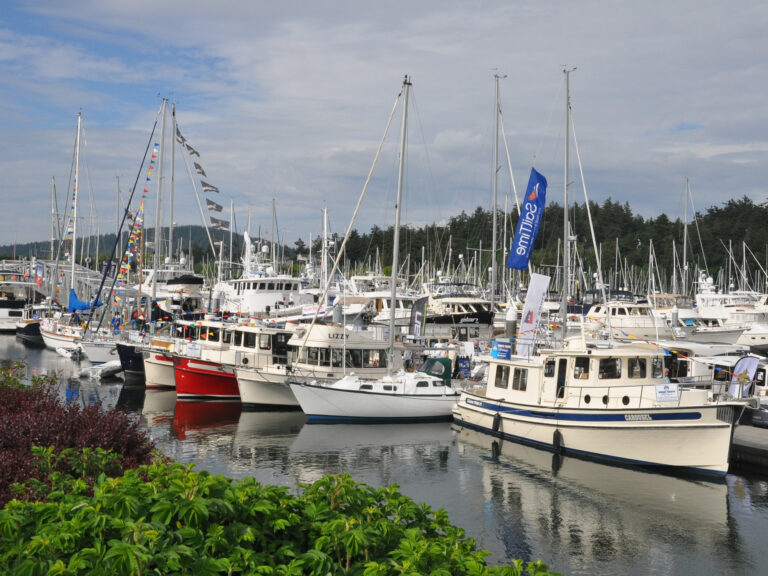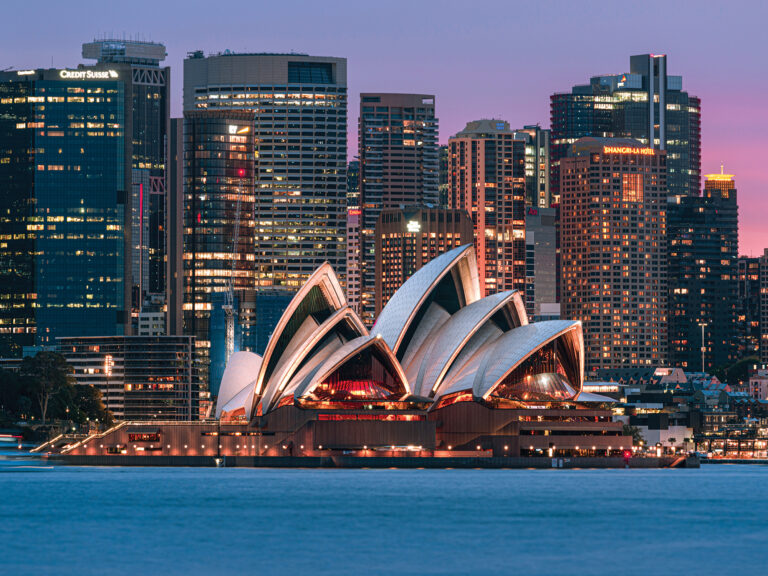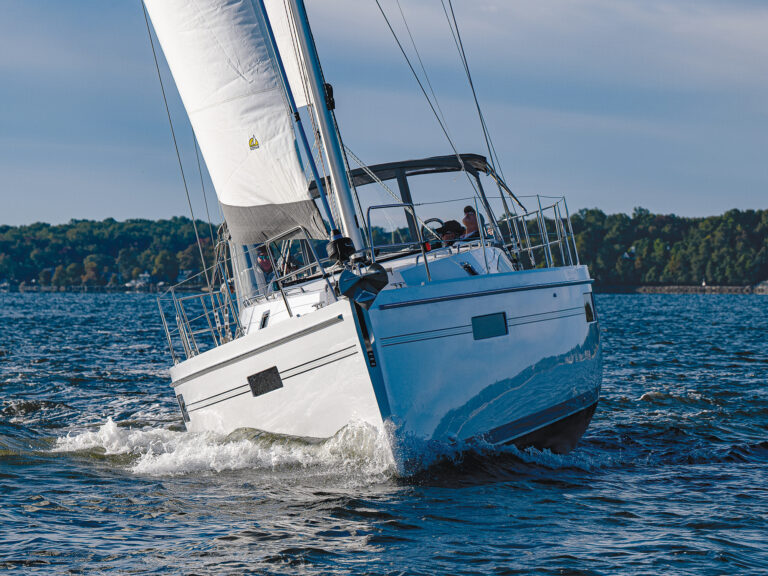After 55 years of living aboard, I am still fascinated by the evolving social fabric of the global cruising community. There are certain places where the herd clearly prevails: Georgetown, on Great Exuma, in the Bahamas; Camp Grenada in the Grenadines; Whangarei, New Zealand; Vava‘u, Tonga; Port Townsend, Washington; Langkawi, Malaysia; Finike, Turkey; Cabo San Lucas, Mexico; Simpson Bay, Sint Maarten. These locations have enough energetic new cruisers arriving each season to carry on the established social interactions of those long-term liveaboards who are “hard aground on their own coffee grounds,” as the saying goes.
Then there are other harbors nearby that have zero social scene, at least when it comes to organized fun. Only an idiot would attempt to gather the artful drunks of Gustavia’s harbor in St. Barts, the loners of Moorea, the raging capitalists of Singapore, the ’roo wrestlers of Darwin, or the cash-rich unindicted of Costa Rica. It just wouldn’t fly.
In essence, there is a diversity of harbor communities within the cruising community, just as there is a diversity of individuals.
Let’s take a look at why Camp Grenada is so popular. First off, Grenada, the southernmost isle of the Lesser Antilles, is blessed location-wise. It’s never hot, never cold and always breezy. The vast majority of Caribbean hurricanes pass well to the north, but still there’s plenty of rainfall. Best of all, there are harbors and marinas that cater to every style and taste. A visitor can tie to a megayacht pier in St. George’s and numerous smaller modern marinas along the south coast. Want to pick up a mooring? Can do! Want to anchor out but still have all the conveniences? No problem, mon! Or do you want to drop the hook somewhere off by yourself, for free? There’s plenty of room for dat too, me son!
The size of the island is Goldilocks-right: not too big, not too small. But the real magic is the synergy between the migratory cruisers and the rainbow-hued residents of the Spice Isle. The cruisers need and want services, and the locals crave customers, so daily volunteer VHF radio nets have sprung up to facilitate this communication. The result is financial, social and cultural intercourse among cruisers of all persuasions. The harbors of Grenada are plug-and-play. You show up, smile, and you’re welcomed with open arms. A few years ago I sold Wild Card, my Hughes 38, to a young couple whose first real cruising port was Grenada. They were immediately embraced by the marine community there, and within days were bosom buddies with half the liveaboards in the lower Grenadines.
Ditto our Turkish cruising friends Selim and Nadire of Keyif. They’d dreamed of cruising the Caribbean for decades but were shy because of their newbie ocean-sailor status. Yet in Grenada they were immediately swept up, drinking champagne out of their running shoes with the notorious Hash House Harriers and bathed in sailor love 24/7.
Similar scenarios play out in Georgetown, Great Exuma, during the winter season, and in places like Newport, Rhode Island; Annapolis, Maryland; Georgetown, South Carolina; and Florida ports like St. Augustine, Fort Liquordale and Key Wasted. They too have their vibrant liveaboard communities with their own rites and rituals.
Then there are those cruising landfalls that used to have wonderful communities, but no longer. Trinidad had everything going for it, but then crime spun out of control. Charlotte Amalie on St. Thomas was ground zero of the Caribbean chartering industry until greed (on all sides) got in the way to give that coveted title to Road Town, Tortola, on a silver platter. New Orleans used to be party central in the Gulf of Mexico. Boston is yesterday. Papeete on Tahiti died with Quinn’s Bar. Cape Town, South Africa, lost the heat. Brazil is now too dangerous. And Bermuda has priced itself out of the market along with the Balearics.
Chagos used to be heaven on earth until its British administrators discovered penniless yachties were having orgasmic fun there. They dourly clamped down on the revelry by using insurance and regulations as a limiting device.
But for every faded harbor, there’s a new mecca arising. The Azores are gaining buzz. Barbados is a gem if you bring flopper-stoppers to counter the roll. Vanuatu’s Tanna continues to tantalize, as does the capital, Port Vila. Musket Cove in Fiji is still crowded. Bali would be totally beautiful if it could eliminate the graft of its central government. Mayotte in the Indian Ocean is laden with French pastries, and the muscular French Foreign Legion troops still do calisthenics at dawn in cute little hot pants in front of the waterfront bistros, much to the amusement of the cruising wives.
And I dare not even mention my favorite watery spots on planet Earth for fear of unleashing a cruising stampede.
Of course, there’s a downside to all this warm and fuzzy marine-community love. As our numbers get larger, so does the gene pool. There is no law forbidding a crazy person from buying a boat, and so the VHF radio nets of Simpson Bay and Camp Grenada have to occasionally endure various misogynists, paranoids and closet racists. Humankind can also be human-unkind, I need to remind myself. Plus, many sailors (myself included) are conflicted. Sure, I wholeheartedly love my fellow cruiser in the abstract — but not always in the flesh. I don’t consider myself a joiner. I don’t always want to shop for groceries on Wednesday morning because it’s convenient for “our harbor’s taxi man.” And, no, I no longer consider getting hit nightly by a rum squall mandatory.
The problem with the herd is that a “no, thanks” can be misinterpreted as a “buzz off” by the overly sensitive. Politics rears its ugly head. People start telling each other what to do, when to do it and whom to do it with. Yeeck!
I sailed away from such a civilization, but I’ve noticed how it automatically springs up wherever I stay too long. And yet, that said, I find interacting with the locals of the Caribbean, Pacific and Indian oceans half the fun of world cruising.
Ultimately, the voyaging sailor realizes that all communities and social groups have tides and stages of tide. They spring up and are shaped by their own unique history.
Take the island of St. John, in the U.S. Virgin Islands, as an example. It is totally blessed with weather. Wind and sea conditions are perfect nearly every day of the year (well, except during hurricanes, when Mother Nature seems to be trying to kill you).
The island’s small size and steep hills meant its sugar plantations were mom-and-pop affairs with two or three slaves, not the harshly treated 500-plus workers found on St. Croix, for instance. And many of the St. John slaves were allowed to grow their own gardens, though that was really to save the slave owner money. Eventually these slaves inherited the land, cultivated it, and began trading with Tortola. An entrepreneurial class of resilient, proud West Indians was born.
Then a few highly adventurous Continentals (a term referring to U.S. residents), like Ethel McCully, author of Grandma Raised the Roof, moved in. Laurance Rockefeller tossed a hook in the placid waters of Caneel Bay and soon bought most of the island. A park sprang up, and Smokey Bear hats were sighted. Forrest Fisher started renting out his Jeep. Cid Hamling stumbled ashore and wondered how to make a telephone call. Yours truly discovered Great Cruz Bay in the latter ’70s, and was aboard the seventh boat to anchor there. Now there are 107 vessels on a slow day.
Over time, various sailors moved ashore, opened businesses and became millionaires. And the scene changed. Slow Jeeps crammed with laughing islanders faded; solo-driven SUVs with tinted windows began to predominate. The island once had 700 of the friendliest West Indians and 50 of the coolest Continentals on the planet. Then someone in Washington changed the wording of some tax regs, and it was suddenly economically advantageous for certain people who were not interested in boats or diving or Bob Marley or Derek Walcott to reside there. Someone else with dollar signs in his eyes looked out into the harbor and said, “We need an expensive marina here, even if we have to shove it down those sailors’ throats.” Then another land shark winked and said, “He who controls the dinghy dock, controls the purse strings.” Ebb and flow, flow and ebb. Tides change. Fortune continually moves; it knows neither borders nor ideology, and cruising sailors can seamlessly move with it. It’s our blessing and our curse.
We don’t have to live with bad government decisions; we can vote with our keels. This makes us unique. And thus I believe (at my most grandiose, delusional and overly dramatic) that the multihued international marine community is a sort of fluid, freedom-seeking, borderless culture of the future. We seek quality of life above all else.
We shall see how it unfolds. My daughter keeps urging me to write The Sea Gypsy Manifesto to explore the philosophical underpinnings of this concept more fully. Maybe I will — when I get time. Right now I’m off on a Langkawi, Thailand, mangrove walk and eco-tour with a bunch of other world cruisers. The adventure was organized and booked over channel 68 on the VHF. Ah, civilization — how I dearly love and royally loathe it!
Carolyn and Cap’n Fatty are now back in Singapore with sails furled at the Changi Sailing Club, happily changing the diapers of dark-eyed Tessa Maria, their newest granddaughter.
